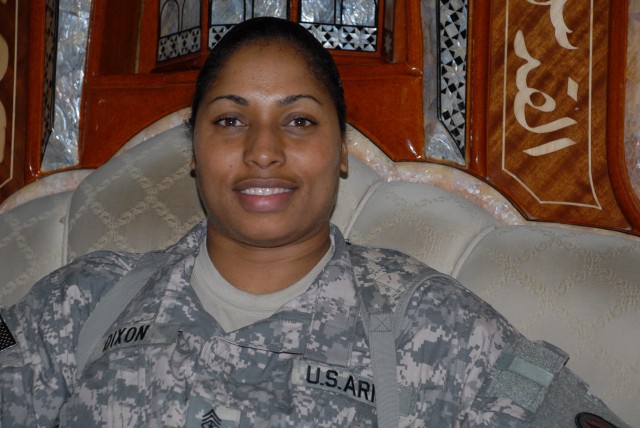Sgt. Maj. Monica J. Dixon, an Ashville, N.C., native, Multi-National Corps-Iraq chaplain sergeant major, is the first female chaplain assistant to achieve jumpmaster status.
She joined the Army in 1987 after graduating from Ashville High School and spending a year at Ashville Technical College.
"I wanted to be a medical supply specialist," Dixon said. "That is what I really wanted to do, but at the time it was not available. The only thing available was chaplain assistant and petroleum supply specialist."
"They said if you just get in the Army, you can always change your mililtary occupational specialty once you completed your four-year contract," Dixon said. "I wanted to change my MOS, but after four years I liked the people and enjoyed what I was doing. I said, 'Ok, I give it another four years.' Here I am 20 years later, still a chaplain assistant."
"I joined the Army because I wanted to be independent," Dixon said. "I came from a well-balanced home, but I just wanted to get out from under my mother's rules. Some people want to be independent and others do not."
"While I was at Fort Bragg, my peers strongly encouraged me to try for jumpmaster," said Dixon. "I was planning to attend, but I got orders for Korea which delayed it for a year. When I got back to Fort Bragg, I was with the 82nd and attended jumpmaster training."
"The course is two-weeks long," Dixon said. "It includes practical work in the aircraft. When approaching the landing zone the jumpmaster stands at the opening and watches for landmarks which stand for the one minute and thirty second timer. Once over the jump zone the jumpmaster must make sure everyone gets out of the aircraft. Once everyone is out of the aircraft, the jumpmaster must then jump."
Dixon said the hardest part of jumpmaster training is the Jumpmaster Primary Inspector test. "They give you three minutes to inspect three jumpers. The instructors put defects on them to make it challenging. When inspecting, the jumpmaster candidate must use the correct phraseology when calling out the deficiencies on the jumpers," Dixon explained. "I was a first time go," she said proudly.
"My favorite part of my military career has been being a drill sergeant for the chaplain assistants," said Dixon. "I got to see Soldiers transform into chaplain assistants as they went from a more structured Basic Combat Training to having weekends off and more liberties," she said. "It was a selfless service experience. Everything that goes on lies with the drill sergeant."
Dixon comes from a family of military tradition. Her brother, William Dixon, is retiring from the Navy after 24 years in service as a Senior Chief April 4. "I'm deployed so I can't be there for his retirement," she said.
"Sgt. Maj. Dixon is well known as a chaplain assistant," said Staff Sgt. Lesley Torres, the noncommissioned officer in charge at the MNC-I chaplain headquarters. "She is a great leader. She leads from the front. I learned how to delegate, lead and train solders from Sgt. Maj. Dixon who took the time to mentor me."


Social Sharing